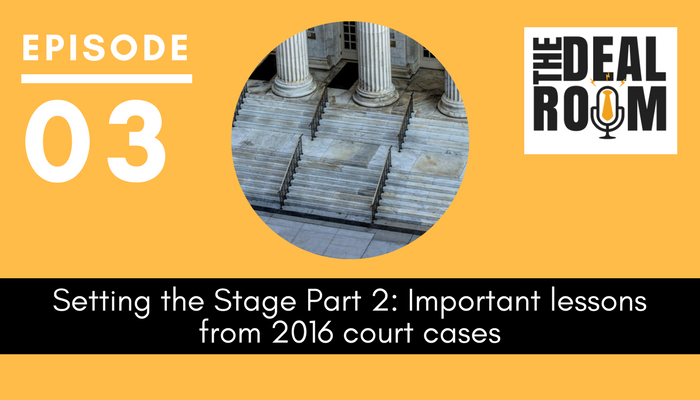
In this episode we will flesh out more issues from overarching themes of 2016 cases relating to business sales and acquisitions and we’ll be discussing important reminders for buyers and their advisers. We’ll talk about employment issues, restraints, possession before full payment, and much more.
Episode Highlights:
00:43 Reminders for purchasers and their advisers
04:06 Employment issues after a business sale
05:34 Reasonableness of restraints
07:16 Possession before full payment
07:55 Enforceability of Heads of Agreement
09:22 Risks in Speeding Up the Proper Sale Process
11:28 About Our Future Episodes
12:14 What’s Up Next?
Reminders for purchasers and their advisers
Equally, last year contains some important reminders for purchasers and their advisers in the area of misleading and deceptive conduct.
Firstly and most importantly, the first resort has to be good quality due diligence. And we’ll talk about due diligence probably quite a few times moving forward in The Deal Room podcast episodes. We’ll talk to advisers who are involved in the due diligence process. We’ll talk with advisers who are engaged in finding holes in material that’s been produced as part of due diligence. And we’ll also talk about business owners, about their experiences with due diligence to give a really rounded approach on how to weather risk and traps are moving forward.
But for today, I think in terms of understanding the high level themes the first thing just to bear in mind is that in buying a business, purchasers and their advisers might need to make sure that they’re undertaking investigations that help really understand the business that’s being purchased. They need to be asking the right questions. They need to be drilling into information thoroughly because many of the cases that we had related to financial information being misleading. Sometimes it related to client contract information being misleading and in some cases it was even lease information that was misleading. There was one great case last year which I thought was quite memorable where a lease didn’t even end up existing. So the poor purchaser was left after the sale without any premises.

In the future, we’ll go through some of these cases and talk more about how you avoid this sort of risk from occurring. Because even though in many of these cases the purchasers ended up being awarded damages by the courts, in some cases they weren’t. And even for those who were victorious, it was in many instances a hollow victory because by the time you get a matter to court you’ve expended a hell of a lot of time, money, effort, and let’s not even start talking about the cost in getting that money that matter to court. So really it’s about warding these issues off at the past.
The best answer really is in doing solid investigative work before you get to a contract. It’s about getting the right advisers on board who can help to guide you through how to drill in to the information in a way that helps you get a better feel for the true operation of your business. Being thorough in your due diligence and being thorough in your contract no matter what the purchase value is. Because this is one of the traps that we can see played out again and again and again in the cases in 2016.
It wasn’t necessarily the transaction value that indicated the real level of risk in a business. There were instances of business owners who purchased businesses only to have those businesses completely fall over in the years following the sale and create a risk for the purchases that far outweighed the transaction value in the first instance. So I think it’s really important to understand transaction value isn’t in and of itself the only indicator of the value of risk that can be related to these sale transactions.
Employment issues after a business sale
Another theme in 2016 was employment in sales of business dealing with staff can often be one of the most sensitive areas to navigate. And this became evident in the trail of destruction we saw in cases relating to employment issues after business sales.
The major employment theme in 2016 was the question about whether an employee is considered to be a transferring employee under the Fair Work Act, and therefore whether their period of service for the previous employer, either seller, the vendor would be recognized. The determination of this area has wide ranging implications in relation to areas like termination of employees.
In one case a member of staff that was sacked soon after the business purchase completed brought an unfair dismissal claim. The purchaser argued she was sacked because she had sent a client list to the previous owner. Fair enough, you’d think. But the court didn’t so readily agree. They did in the end side with the purchaser but in a fairly awkward way that could have easily swung against the purchaser.
These 2016 cases are a reminder to purchasers of the benefit in sometimes considering getting further protection in a sale environment where it might be needed by informing the employees in writing before the new employment period begins that the period of service with the old employer won’t be recognized.
Reasonableness of restraints
Moving on the next theme in 2016 cases that I want to discuss is restraints. The 2016 restraint cases generally revolved around the reasonableness of the restraints the contracts sought to impose, and thus whether or not they were actually enforceable.
It’s important to say that restraints are often strongly negotiated area of the sale contract. They’re complex and quite often problems will only arise after completion, and that is the point when the restraint term is actually tested. Restraints can be an excellent way for a purchaser to protect their purchase and they’re not always the toothless tigers that many suggest they are. However, as the cases last year showed, they can be very complicated.
In some of the cases, we saw restraints being upheld and in some cases they weren’t. And the answer which way the cases fall came back to that important test of reasonableness and the interpretation of the actual clauses.
The cases demonstrated that business owners really need to ensure they’re getting high quality advice before entering into restraints. Failing to get that right advice could see you as a purchaser suffering severe compromise in the ongoing value of your business, if it’s eroded by a seller that pushes the boundaries of the restraint. On the flip side, if you enter into a restraint as the seller without seeking the right advice you may see yourself facing the difficult choice of giving up your livelihood entirely or staring down the barrel of the loaded gun that is litigation.
Possession before full payment
And finally in our recap of the top themes in business sale cases from 2016, we come to the issue of possession before full payment or in some instances, there are even cases of possession before completion, cases in which purchasers were given the keys to the kingdom before they had fully paid. The cases showed time and time again that there is little motivation left for the purchaser to pay once they gain full control of the business. But on the flip side, it also shows the dangers for purchasers in becoming too fully committed to a business, for example in taking over possession before completion before having all of their ducks in the line.
Enforceability of Heads of Agreement
Other worthy mentions out of 2016 include issues with using heads of agreement. In one case, we saw an argument arise over whether that document was binding and enforceable or not, which is an interesting question about heads of agreement, memorandums of understanding or the terms of the commercial terms or terms of sale depending on what you’re calling it.
It’s really interesting when we stop to think about whether or not these documents are going to be binding and whether we want them to be enforceable or not, because often lawyers aren’t consulted at that point of entering into those commercial terms. So it’s really important that if you work as a broker or otherwise in this area where you might deal with heads of agreement or commercial terms, you understand what can lead to a binding arrangement and what doesn’t lead to an enforceable arrangement. Because we have seen issues time and time again with business owners relying on deals that they think that they have managed to wrangle or get agreement to only to find that during due diligence there beat down on the price once again because of information that arises there.
On the flip side, we have also seen situations and we see situations in the cases where parties believe they’re not bound and then suddenly find that in actual fact the documents that they have signed has been enforceable and bind them to a sale that they no longer want to be committed to.

Risks in Speeding Up the Proper Sale Process
And the last honorable mention out of 2016 cases is issues and cases arising out of brokers and other advisers trying to speed up and short cut the proper sale process. There certainly were lots of instances of issues that arose then when the proper checks and balances hadn’t been followed through, which can lead to often higher level risk for brokers, accountants and other advisers involved in those situations.
I think the major overriding theme out of the 2016 business sale cases is simply about detail and about getting the right group of advisers on board in a timely way. Arguments are messy, time consuming and expensive. For purchasers and sellers, it’s about ensuring that you spend some time understanding the process and the potential pitfalls. And for us advisers, the 2016 cases are a reminder to us all about having the right team around us. A team that knows what they’re doing and is on top of understanding what can go wrong. Because that synergy of the right team results in a better deal being done and better pieces of advice, essentially helping to prevent issues from occurring in the first place.
I hope you enjoy this little journey through the 2016 cases. These cases are often extreme examples of issues that can arise, but it’s a really useful exercise to keep on top of understanding what makes it to court. Because as I said before more than 95 percent of disputes won’t make it that far into court. It gives us great insight into how to deliver exceptional outcomes to our clients. And it’s a great display of the sort of information that will be providing to our listeners through The Deal Room podcast in future episodes.
The format of the Deal Room won’t usually be like this. I just wanted to kick it off by giving you an overview of the legal and financial issues at play. Some of the things to consider if you’re a buyer or seller and some of the things that you should be considering if you’re an adviser in this area.
About Our Future Episodes
Moving forward, we’ll be interviewing experienced professionals in the industry and buyers and sellers who have walked the path themselves. We’ll also from time to time go into some of these past cases to provide real and current information about risks and traps for buyers, sellers and their advisers. In order for us all together to raise the bar in the outcomes that we can all achieve in the sale process.
Thank you for listening to the dealer room podcast. This was the last episode in a three part podcast launch series for the Deal Room. We identified the key areas from recent cases that are important for buyers and their advisers to be reminded of.
What’s Up Next?
Now in just a few days’ time, Elizabeth Lee, who heads up our Commercial Law and Acquisitions Division at Aspect Legal will join us in our next episode of the Deal Room to talk about some more legal tips to prime businesses for market. I hope you’ll be able to join us for that episode.
If you want to make sure you don’t miss an episode, please subscribe to the podcast through iTunes or your favourite player. And if you like what you heard, you’re in for a treat!
We’re giving out six bottles of Moet to the first six people to leave as fabulous reviews on iTunes. In order to get your bottle of Moet, after leaving us a review in iTunes, pop us an email to promotions[at]aspectlegal[dot]com[dot]au with your name and Australian postal address. Please note this offer closes 31st of August 2017 and is available to anyone listening within Australia. So once again thanks for tuning in. And we’ll see you next time!
Disclaimer: The material contained on this website is provided for general information purposes only and does not constitute legal advice. You should not depend upon any information appearing on this website without seeking legal advice. We do not guarantee that the contents of this website will be accurate, complete or up-to-date.
Liability limited by a scheme approved under Professional Standards Legislation
















